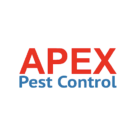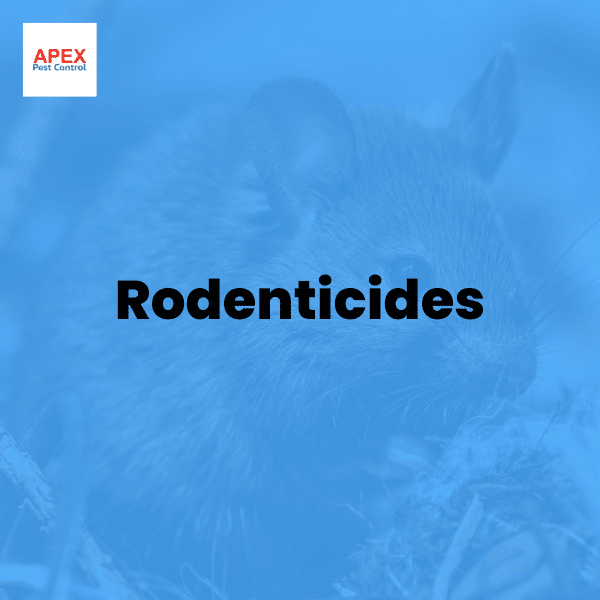Efficient Rodenticides: The Key To Successful Rat Control
At Apex Pest Control, we understand the importance of effective rodent management. This comprehensive guide explores rodenticides, their types, proper usage, and alternatives to help you make informed decisions about pest control.
Explore our in-depth guide on Rat Traps, featuring effective methods and actionable tips to keep your environment rodent-free.
Definition of Rodenticides
Rodenticides are chemical substances specifically designed to eliminate rodents, including rats, mice, and other pest species. These pest control products play a crucial role in managing rodent populations in various settings, from residential homes to commercial properties and agricultural areas.
History and Evolution of Rodenticides
The use of rodenticides dates back centuries, evolving alongside human efforts to combat rat infestations. Early rodenticides often included highly toxic substances like arsenic and strychnine. However, modern formulations have been developed to balance efficacy with safety concerns for non-target species.
Types of Rodenticides
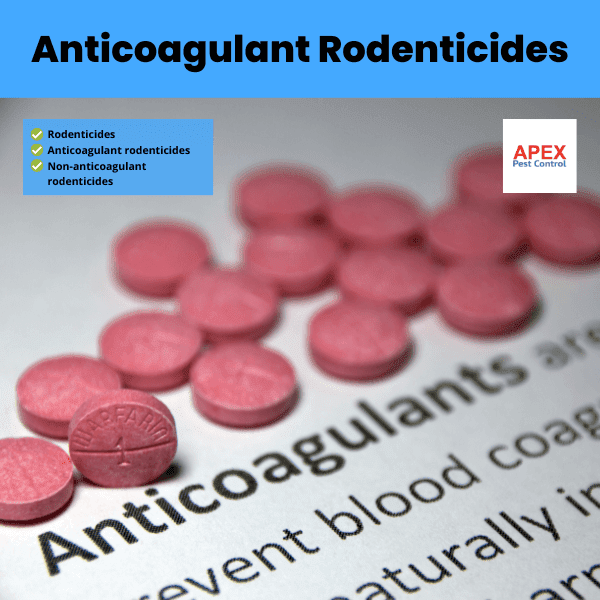
Anticoagulant Rodenticides
Anticoagulant rodenticides are the most common type used today. They work by disrupting the blood clotting process in rodents, leading to internal bleeding and eventual death.
First-Generation Anticoagulants
- Warfarin
- Chlorophacinone
- Diphacinone
These require multiple feedings to be lethal and are generally considered less toxic to non-target animals.
Second-Generation Anticoagulants
- Brodifacoum
- Bromadiolone
- Difenacoum
These are more potent and can be lethal after a single feeding, but pose higher risks of secondary poisoning to predators.
Non-Anticoagulant Rodenticides
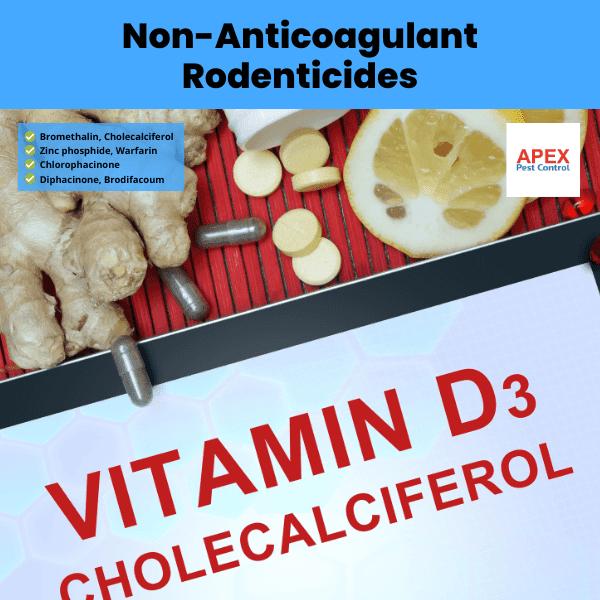
Non-anticoagulant rodenticides work through different mechanisms and are often used when rodents have developed resistance to anticoagulants.
- Bromethalin: Affects the nervous system, causing paralysis and death
- Cholecalciferol (Vitamin D3): Raises calcium levels, leading to organ failure
- Zinc Phosphide: Produces toxic phosphine gas in the rodent’s stomach
How Rodenticides Work?
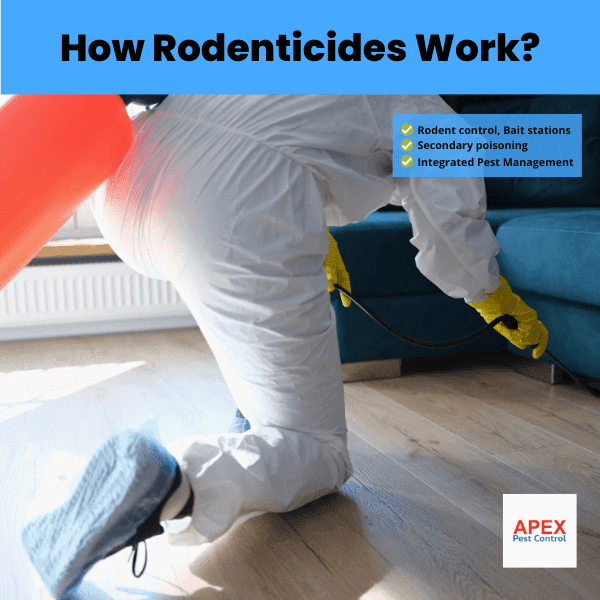
The effectiveness of rodenticides lies in their ability to interfere with essential bodily functions, leading to the rodent’s demise. The exact mechanism varies depending on the type of rodenticide used.
Anticoagulant Mechanism
Anticoagulants inhibit the production of vitamin K-dependent clotting factors, causing internal haemorrhaging over time. This delayed action helps prevent bait shyness in rodent populations.
Non-Anticoagulant Mechanisms
- Bromethalin: Causes cerebral oedema and seizures
- Cholecalciferol: Leads to hypercalcemia, resulting in organ damage
- Zinc Phosphide: Produces toxic gas upon ingestion, causing rapid cell death
Uses of Rodenticides
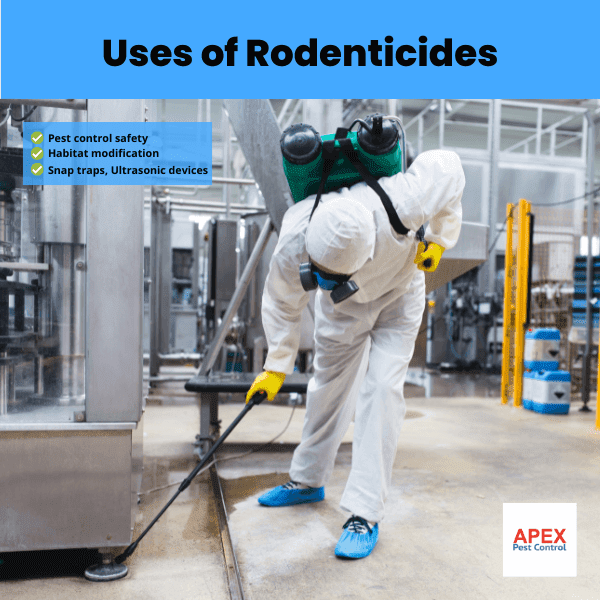
Rodenticides are employed in various settings to maintain hygiene and prevent disease transmission:
- Residential properties
- Commercial buildings
- Agricultural facilities
- Urban environments
- Food storage and processing areas
Integrated Pest Management (IPM)
At Apex Pest Control, we advocate for an IPM approach, which combines chemical control methods with other strategies for comprehensive rodent management. This includes:
- Habitat modification
- Exclusion techniques
- Sanitation improvements
- Monitoring and early detection
How To Use Rodenticides Safely?
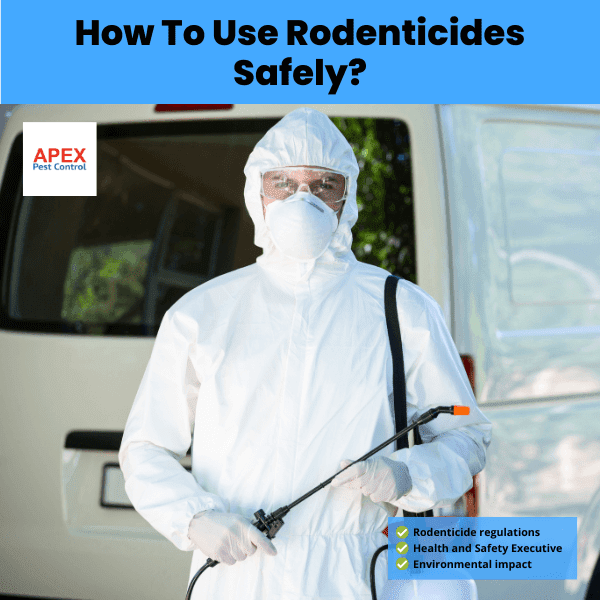
Proper application of rodenticides is crucial for effectiveness and safety. Follow these guidelines:
- Conduct a thorough inspection to identify rodent activity areas
- Choose appropriate bait stations to prevent access by non-target animals
- Place bait stations in strategic locations along rodent pathways
- Monitor and replenish bait regularly
- Properly dispose of dead rodents and contaminated materials
Bait Station Placement
- Along walls and corners
- Near entry points
- In attics and crawl spaces
- Around exterior perimeters
Risks and Dangers of Rodenticides
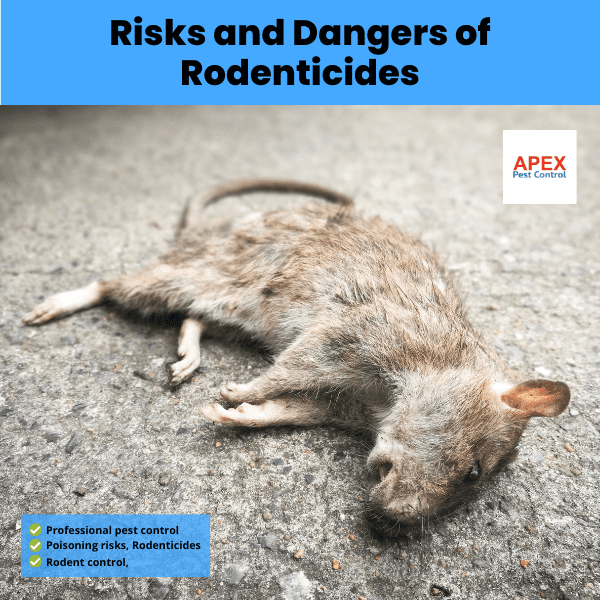
While effective, rodenticides pose several risks that must be considered:
Potential Harm To Non-target Animals
Secondary poisoning can occur when predators consume poisoned rodents. This risk extends to pets and wildlife, particularly those with second-generation anticoagulants.
Risks To Humans, Especially Children
Accidental ingestion by children is a serious concern due to their curiosity and the often-attractive appearance of baits.
Environmental Impact
Rodenticides can contaminate soil and water sources, affecting ecosystems beyond the target area. Persistent organic pollutants (POPs) like some second-generation anticoagulants can accumulate in the food chain.
Safe Handling and Storage of Rodenticides
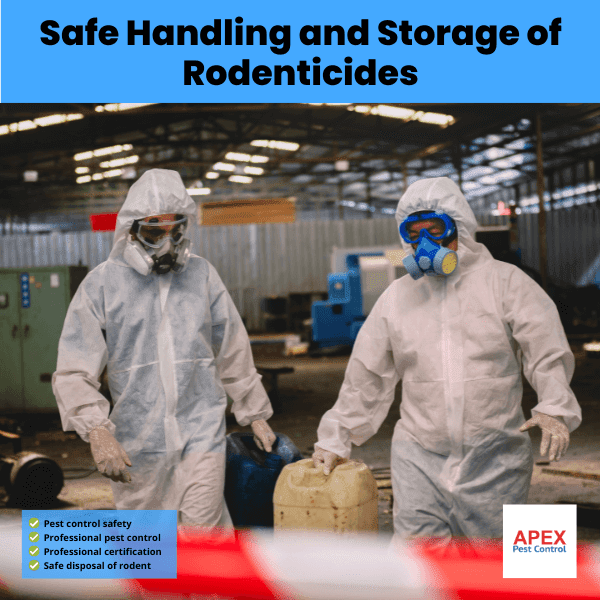
Proper Storage Methods
- Store in original, clearly labelled containers
- Keep in locked cabinets out of reach of children and pets
- Maintain in a cool, dry place away from food items
Safety Measures When Handling Rodenticides
- Wear protective gloves and appropriate PPE
- Avoid inhalation of dust or vapours
- Wash hands thoroughly after handling
- Use tools dedicated to bait handling to prevent cross-contamination
Alternatives to Rodenticides
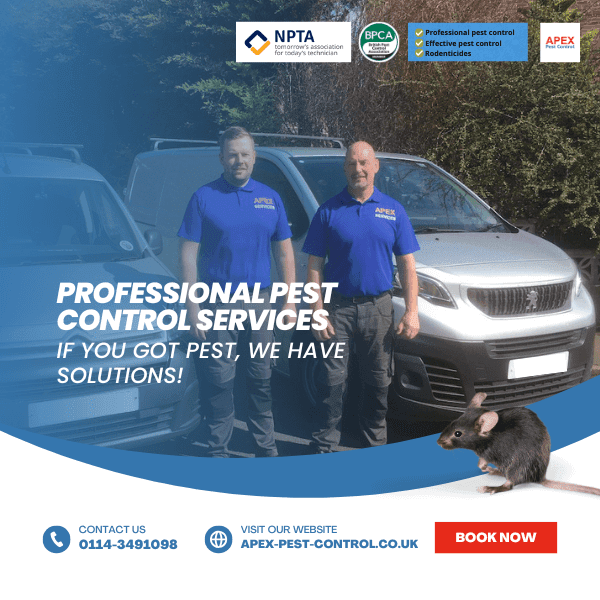
At Apex Pest Control, we offer a range of alternatives for those seeking non-toxic rodent control options:
Natural Alternatives
- Peppermint oil repellents
- Ultrasonic devices
- Predator urine (e.g., fox or coyote)
Mechanical Alternatives
- Snap traps
- Live-catch traps
- Electronic traps
Professional Pest Control Services
Our expert technicians at Apex Pest Control provide comprehensive rodent management solutions tailored to your specific needs.
Legal Regulations Surrounding Rodenticides
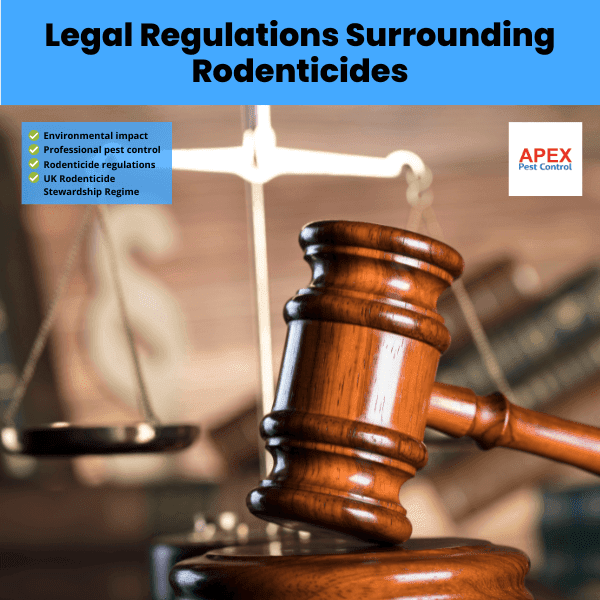
Laws and Regulations in Different Regions
Rodenticide use is regulated by various agencies, including the EPA in the United States and the HSE in the UK. Always check local regulations before using rodenticides.
UK-Specific Regulations
- The use of rodenticides in the UK is regulated by the Health and Safety Executive (HSE) under the Control of Pesticides Regulations 1986.
- Only rodenticide products approved by HSE can be legally used, and they must be used in accordance with their conditions of authorisation.
- The UK Rodenticide Stewardship Regime governs the use of second generation anticoagulant rodenticides (SGARs).
- Professional users must have proof of competence, such as certification from an approved training course.
- Non-professional users are restricted to purchasing rodenticides with no more than 0.003% active substance in limited package sizes.
- Outdoor use of certain rodenticides will be illegal from July 4, 2024, except for use immediately around buildings.
Consequences of Misuse or Illegal Use
Improper use of rodenticides can result in fines, legal action, and environmental damage. Always follow label instructions and local regulations.
Recent Developments in Rodenticide Research

New Types of Rodenticides
Research is ongoing into more targeted and environmentally friendly rodenticides, including:
- Species-specific formulations
- Fertility control agents
- Combination products with enhanced efficacy
Advances in Safety Measures
- Improved bait station designs
- Development of antidotes for accidental poisoning
- Enhanced tracking methods for bait consumption
Case Studies on Rodenticide Use
Successful Uses of Rodenticides
When used correctly as part of an IPM strategy, rodenticides have effectively controlled rodent populations in various settings, from urban environments to agricultural areas.
Instances Where Rodenticides Caused Harm
Unfortunately, there have been cases of non-target animals, including pets and wildlife, being affected by rodenticides. These incidents underscore the importance of proper use and consideration of alternatives.
Steps To Take If Rodenticide Is Ingested
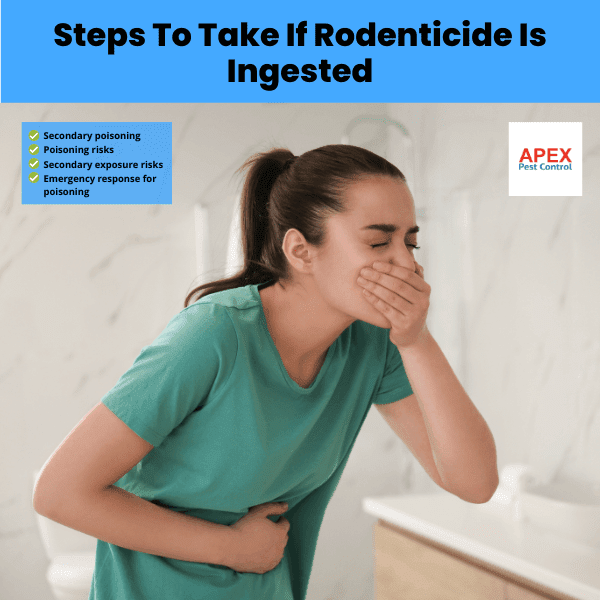
Immediate Actions To Take
If ingestion is suspected, do not induce vomiting unless instructed by a medical professional. Contact poison control immediately.
In the UK, you can contact poison control through the following methods:
1.National Poisons Information Service (NPIS): The NPIS provides expert advice to healthcare professionals on the diagnosis, treatment and care of poisoned patients. Members of the public cannot contact NPIS directly, but should instead:
2. Call NHS 111: For non-emergency poisoning inquiries, call NHS 111. This free helpline is available 24 hours a day, 7 days a week. They can provide advice and direct you to appropriate medical care if needed.
3. Call 999: In case of a serious poisoning emergency, call 999 immediately for an ambulance.
Contact your GP:
- For less urgent concerns, you can contact your general practitioner for advice.
- The NHS website (www.nhs.uk) provides information on poisoning, including symptoms and when to seek medical help.
Local pharmacy:
- Your local pharmacist may be able to provide advice for minor poisoning concerns.
Remember, in any case of suspected poisoning, it’s important to seek medical advice promptly. Healthcare professionals in the UK have access to the NPIS for expert guidance on managing poisoning cases.
Full disclaimer, Apex Pest Control does not offer medical advice. If you suspect any health issues related to rodenticides, ALWAYS talk to professional medical services.
When To Seek Medical Help
Always seek immediate medical attention in cases of suspected poisoning, regardless of symptoms.
Summary of Key Points
- Rodenticides are effective tools for rodent control but must be used responsibly
- Various types exist, including anticoagulant and non-anticoagulant formulations
- Proper application and safety measures are crucial to minimise risks
- Consider alternatives and integrated pest management approaches
- Always comply with local regulations and guidelines
At Apex Pest Control, we’re committed to providing safe, effective, and responsible pest management solutions. For expert advice and professional rodent control services, don’t hesitate to contact us. Let’s work together to create a pest-free environment while prioritising safety and environmental responsibility.
Frequently Asked Questions
What are the main types of rodenticides?
The main types are anticoagulants (first and second generation) and non-anticoagulants like bromethalin, cholecalciferol, and zinc phosphide.
How long does it take for rodenticides to work?
It varies by type. Anticoagulants may take 4-7 days, while acute toxicants like zinc phosphide can work within 24 hours.
Are rodenticides safe to use around pets?
No, most rodenticides are toxic to pets. Always use tamper-resistant bait stations and keep pets away from treated areas.
What’s the difference between first and second-generation anticoagulants?
Second-generation anticoagulants are more potent and can be lethal in a single feeding, while first-generation types require multiple feedings.
Can rodenticides cause secondary poisoning?
Yes, particularly with second-generation anticoagulants. Predators or scavengers can be poisoned by eating rodents that have consumed the bait.
Are there any eco-friendly alternatives to chemical rodenticides?
Yes, alternatives include traps, ultrasonic devices, and natural repellents like peppermint oil. Integrated Pest Management (IPM) approaches are also effective.
How should rodenticides be stored safely?
Store in original, clearly labelled containers in a locked cabinet out of reach of children and pets, away from food items and in a cool, dry place.

Tony Johnson, Founder & Lead Technician at Apex Pest Control, is a BPCA and NPTA accredited pest management expert with over 35 years’ hands-on experience. Tony specialises in Integrated Pest Management and ensures all services comply with UK pest legislation, including the Wildlife and Countryside Act 1981 and COSHH Regulations 2002. His commitment to continual learning and adapting to industry best practices means clients receive effective, safe solutions for pests affecting homes and businesses across South Yorkshire. Tony’s dedication to professional standards, ethical treatment methods, and local expertise has made him a trusted partner for pest control and prevention.
-
BPCA & NPTA accredited | CHAS certified
-
Committed to UK pest law compliance & safety
-
Focused on effective, ethical pest management for South Yorkshire
